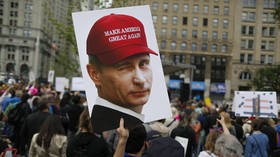Is everyone a Russian agent now?
By Paul Robinson, a professor at the University of Ottawa. He writes about Russian and Soviet history, military history and military ethics, and is author of the Irrussianality blog. He tweets at @Irrussianality.
In recent years, governments have created armies of online warriors designed to fact-check alleged Russian ‘disinformation.’ Worryingly, these guardians of the truth are often more dangerous than the threat they claim to combat.
Most analysts grounded in reality accept that Russia is not about to invade Ukraine. Still, the breathless speculation to the contrary in much of the Western media this month has had the virtue of concentrating a few minds. Suddenly alert to the seriousness of the situation, a few of the more sensible commentators have come to the conclusion that the West ought perhaps to reconsider its policy towards Ukraine. The result has been an outpouring of bile that brings to light the difficulty of having an intelligent conversation on anything involving Russia.
A case in point is the reaction to an article last week by the RAND Corporation’s Samuel Charap. Writing for Politico, Charap suggested that the United States should help end the war in eastern Ukraine by using its leverage to persuade the Ukrainian government to fulfil its obligations under the 2015 Minsk II agreement, according to which Ukraine is meant to grant “special status” – i.e. political autonomy – to the rebel region of Donbass.
This is hardly a novel proposal. Others have been saying the same thing for several years. But the RAND Corporation, for which Charap works, has long been considered the intellectual heart of the American military industrial complex. This gave his article a certain oomph, being seen in some circles as a betrayal of Ukraine from within the core of the American system.
While some people welcomed Charap’s piece, others were furious. Comparisons with Hitler were soon spreading over the internet. Stephen Blank of the Center for European Policy Analysis – a think tank funded by the likes of Lockheed Martin, Raytheon, and the US Department of Defense – penned an article in which he claimed that “Appeasement of Russia would deliver exactly the same outcome as the betrayal of Czechoslovakia at Munich – dishonor and disaster.” “The consequences of following Charap’s advice,” says Blank, would be no less than “the dismantling of the post-Cold War settlement. … The international rules-based order would end.”
Others were not content with mere hyperbole, and sought instead to name and shame the appeasers who had had the temerity to promote Charap’s article. An example was the Ukrainian information warfare outfit Stop Fake which produced a hit piece entitled ‘Are we ready to die for Kyiv? How Twitter is helping to push the West towards surrendering Ukraine.’ In this, Stop Fake denounced journalists who had tweeted links to Charap’s essay, saying that “Kremlin-friendly actors turned it into a mainstream theme.”
Among the “Kremlin-friendly actors,” Stop Fake singled out RT’s Bryan MacDonald, The Independent’s Mary Dejevsky, Meduza’s Kevin Rothrock, Latvian-based Russian journalist Leonid Ragozin, bne Intellinews’s Ben Aris, and the Atlantic Council’s Emma Ashford. One can see why Ukrainian info-warriors might have a beef with someone from RT, and it’s probably fair to say that Dejevsky is relatively fair to Russia as British journalists go. But Stop Fake’s attempts to portray its targets as propagators of “Kremlin metanarratives” is absurd.
Rothrock’s Meduza, for instance, is decidedly hostile to the Russian government. So too is Ragozin, who has often used Twitter to boost the cause of imprisoned activist Alexey Navalny. This, however, didn’t prevent Stop Fake from denouncing him as “just another Kremlin mouthpiece.” And as far as NATO lobby group the Atlantic Council is concerned, to call it “Kremlin-friendly” is like praising cats as “mouse-friendly.” Ridiculous doesn’t begin to describe Stop Fake’s position.
Unfortunately, though, it’s pretty much par for the course for the organization, as for so many others who make up what one might call the “disinformation industry” – that is to say the large and well-funded network of institutions that has sprung up in the past five or six years to supposedly protect democratic societies from the insidious danger of foreign “influence operations.”
Although these institutions purport to be doing valuable work exposing “fake news,” analysis of their output reveals that much of what they produced is decidedly biased. Their own opinions are taken for absolute truth, and anything that disagrees with their interpretation of reality is denounced as “disinformation.” In the process, these organizations spread disinformation of their own.
A report by British academics, for instance, determined that, “The EU’s main task force for fighting Russian disinformation is in danger of becoming a source for disinformation itself, and so of skewing policy decisions in the EU and the UK, as well as distorting public discourse throughout Europe.” The EU’s disinformation outfit, EUvsDisinfo, was guilty of “blatant distortion,” said the report, adding that “the EU is not alone” in this regard.
Indeed, one can find many examples beyond Stop Fake and EUvsDisinfo. The problem is that the disinformation industry does not for the most part consist of independent researchers objectively determining the accuracy of what appears in the media and on the internet. Rather, many of its members are political activists pursuing an extreme agenda and using their power and influence to attempt to silence those who do not agree one hundred percent with them. In this sense, the disinformation industry is quite dangerous. By supporting it, states are elevating entirely unsuitable persons to the position of semi-official guardians of the truth, in the process severely constraining the parameters of public debate.
Take, for instance, the issue of Russia and Ukraine. As the reaction to Charap’s article shows, even people who are far from being “Kremlin-friendly” find themselves being denounced as such if they deviate even slightly from the preferred narrative. This serves to silence voices urging restraint and to block any proposals which offer a peaceful solution to the war in Donbass, on the dubious grounds that any move towards peace is a dissemination of “Kremlin metanarratives.”
Since Donald Trump’s election as US president in 2016, much of the Western world has been in the grip of exaggerated fear of foreign “influence” and “disinformation.” To combat this, governments have empowered zealots who do their utmost to maintain a constant state of international tension. Sadly, as the Ukrainian example shows, the cure is proving to be even worse than the disease.
The statements, views and opinions expressed in this column are solely those of the author and do not necessarily represent those of RT.







Comments are closed.